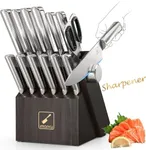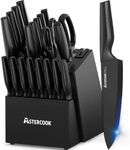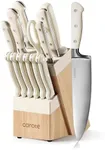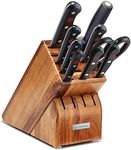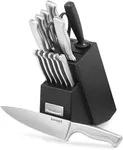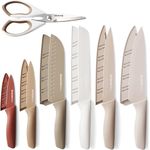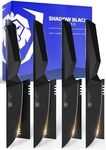Buying Guide for the Best Dishwasher Safe Knives
Choosing the right dishwasher-safe knives involves understanding the key features that ensure durability, performance, and convenience. Dishwasher-safe knives are designed to withstand the harsh conditions of a dishwasher cycle without losing their sharpness or getting damaged. Here are the key specifications to consider when selecting dishwasher-safe knives and how to navigate them to find the best fit for your needs.MaterialThe material of the knife is crucial because it determines the knife's durability, sharpness, and resistance to corrosion. Common materials include stainless steel, high-carbon stainless steel, and ceramic. Stainless steel is highly resistant to rust and stains, making it a popular choice for dishwasher-safe knives. High-carbon stainless steel offers better edge retention and sharpness but may require more maintenance. Ceramic knives are extremely sharp and lightweight but can be more brittle. Choose a material based on your preference for maintenance and durability.
Blade ConstructionBlade construction affects the knife's performance and longevity. Forged blades are made from a single piece of metal and are generally stronger and more balanced, while stamped blades are cut from a sheet of metal and are lighter and less expensive. For dishwasher-safe knives, forged blades tend to be more durable and maintain their edge better through repeated dishwasher cycles. Consider forged blades if you want a knife that will last longer and perform better over time.
Handle MaterialThe handle material impacts the knife's comfort, grip, and durability. Common handle materials include plastic, wood, and composite. Plastic handles are often dishwasher-safe and provide a good grip, but they may not be as durable as other materials. Wood handles are aesthetically pleasing but can be damaged by the dishwasher's heat and moisture. Composite handles combine the best of both worlds, offering durability and comfort while being dishwasher-safe. Choose a handle material that feels comfortable in your hand and suits your cleaning preferences.
Edge RetentionEdge retention refers to how long the knife stays sharp between sharpenings. This is important because a knife that retains its edge well will require less frequent sharpening and provide consistent performance. High-carbon stainless steel knives generally have better edge retention compared to regular stainless steel. If you prefer a knife that stays sharp for longer periods and requires less maintenance, look for one with good edge retention properties.
Dishwasher SafetyNot all knives labeled as dishwasher-safe are created equal. Some knives may withstand occasional dishwasher use, while others are designed for regular dishwasher cleaning. Look for knives that explicitly state they are dishwasher-safe and check user reviews for real-world performance. If you plan to frequently clean your knives in the dishwasher, ensure they are truly built to handle the heat, moisture, and detergents without degrading.
Balance and WeightThe balance and weight of a knife affect how it feels in your hand and how easy it is to use. A well-balanced knife will feel comfortable and reduce fatigue during extended use. Heavier knives can provide more control and power, while lighter knives are easier to maneuver. Consider your cooking style and preferences when choosing the balance and weight of your knife. If you do a lot of chopping and slicing, a well-balanced, slightly heavier knife might be ideal.
